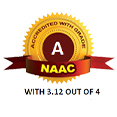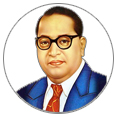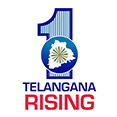Institutional Development Plan (IDP)
Dr. BRAOU: INSTITUTIONAL DEVELOPMENT PLAN
The University
Dr. B. R. Ambedkar Open University (BRAOU), the First Open University in the country, is working with a Motto of “Education for All” especially reaching the unreached. Dr.B. R. Ambedkar’s social philosophy of education as a means of creating an egalitarian society is the vision of this University. Access to relevant quality education and training programmes for diverse sections of society with a focus on hitherto deprived sections at lower costs by using the modern technologies in teaching-learning processes as well as in administrative and support services is the goal of this University. The University programmes aim at making education and training instruments for living and for making a living. In line with the Dr.B.R.Ambedkar’s Philosophy of education, the Government of Telangana State envisages making One Lakh SC/ST school and college dropouts Graduates in Five Years to realize states’ human resource potential to its fullest use in the Higher Education sector with equity and inclusion.
The Campus:
Located on a panoramic, elevated site of 53.63 acres in Jubilee Hills, the University has impressive buildings, green lawns and tree-lined roads that enhance the scenic beauty of the rocks all around. The campus has the Administrative and Learners Support Services Block, CSTD & GRCR&D building, Academic Branch, Science & Technology Multi- functional Labs (STML), EMR&RC and Library building, Study Material House, an extensive Open Plaza, Auditorium, Conference Hall, Centre for Learner Services, Examination Building, Vice-Chancellor’s Lodge and Guest House.
The main Library building also houses the Narla Memorial Library. The campus is well equipped with Science Labs, Computer Centre, Smart class rooms, Seminar Halls and a mini auditorium in the CSTD building.
The Vision
Dr. B.R. Ambedkar’s social philosophy of education as a means of creating an egalitarian society is the vision of this University. Access to relevant quality education and training programmes for diverse sections of society with a focus on hitherto deprived sections at lower costs by using the modern technologies in teaching-learning processes as well as in administrative and support services is the goal of this University. The University programmes aim at making education and training instruments for living and for making a living.
The Mission
-
Enrichment of on-going academic programmes,
-
Competency building through education and training programmes,
-
Interactive individual based teaching-learning processes,
-
Reliable and credible student evaluation systems,
-
Result-oriented, accountable and transparent administrative and logistic support systems, and
-
Research, innovation, training, networking for system development and staff development
Objectives of the University are to:
-
Provide educational opportunities to those students who could not take advantage of conventional institutions of higher learning and encouraging learners to earn while learning.
-
Provide higher educational opportunities through ODL & DOL mode for a large segment of population, including those in employment, women (including housewives) and adults who wish to upgrade their education or acquire knowledge and skills in various fields/sectors
-
Provide flexibility with regard to eligibility for enrolment, age of entry, choice of courses, methods of learning, conduct of examinations and operation of the programmes.
-
Complement the programmes of the existing Universities in the State in the field of higher learning so as to maintain the standards on par with the best universities in the country.
-
Promote integration of educational programmes within the State through its policies and programmes.
-
Offer degree courses and non-degree certificate & diploma courses for the benefit of the working population in various fields and for those who wish to enrich their lives by studying subjects of cultural and aesthetic values.
-
Make provision for research and for the advancement and dissemination of knowledge.
-
Serve as a source of continuing education, consultancy and to provide equal access to knowledge and higher education.
Important Milestones
-
First Open University in India
-
Role Model for many Open Universities in India
-
Access to large number of learners who missed their higher educational opportunities
-
Access to hitherto deprived sections of learners
-
Supplies user friendly Self-instructional quality learning materials (SIM/SLM)
-
Establishment of GRCR&D, CSTD, CIQA and UGC- DEB Affairs for undertaking system based research, imparting training, enhancing quality of services and liaising with UGC respectively
-
Use of Satellite Technology for online teaching-learning services
-
Innovative Undergraduate Programme with Choice Based Credit System (CBCS) combining Foundation courses, Core courses and Application oriented courses
-
First University to offer Science Programmes through ODL mode
-
Offering Professional Programmes viz, B.Ed, Special B.Ed and MBA through ODL mode
-
Adopted the System of Continuous Learner Support Services
-
Established Partnerships and Collaborations for qualitative academic Programmes
-
Promotion of Research and Training for ODL
-
Automation of Library services
-
Technology enabled learner support Services and Systems
-
Established Regional Coordination Centres (RCCs) in Ten (10) erstwhile District Headquarters of Telangana
-
Established huge Network of Learner Support Study Centres (103) across the state.
-
Introduction of Online Services and paperless administration and Biometric system.
Infrastructure
Created the following Infrastructure for Support Services which includes: Learner Support Services Brach; Centre for Staff Training and Development (CSTD); Prof G.Ram Reddy Centre for Research & Development (GRCR&D), Academic Branch, Science & Technology Multi- functional Labs (STML), Electronic Media Research &Resources Centre (EMR&RC) and Library building, Study Material Houses-I ⅈ Auditorium with 800 seating capacity; Mini-Auditorium with 200 seating capacity; Six (6) Conference Halls, Centre for Learner Services, Examination Building with 40,000sft.
REIMAGING BRAOU WITH GOOD GOVERNANCE PRACTICES
-
Scaling Admissions
-
Any time admission & on demand exams
-
ABC system course wise registration / micro credentials
-
Students retention and success
-
Academic programmes
-
Infusion of life skills into Academic programmes
-
Integration of Life skills with employability
-
Introduction of add on courses
-
Net working through collaborations and partnerships
-
Teaching learning evaluation strategies
-
Integration of MOOCs and OERs with Learning resources
-
Continuous Assessment of student competencies
-
Development of learning recourses for life long learning
-
Learner support system
-
Strengthening Interactive Learner Support System
-
Technology enabled Grievance Redressal Mechanisms for LSSs
-
Change Management & LSS process Reengineering with structural reforms
-
Governance / system management
-
Personnel & Institutional Capacity Building
-
Technology enabled management systems
-
Building Flexible, Responsive, Transparent & Accountable Systems
STRATEGIC PLAN
-
To Enhance Excellence in programs and services wherein it is proposed to take the action points on the existing courses and new courses coupled with interdisciplinary flavor initiative, strengthening the Choice Based Credit System (CBCS) at UG level.
-
More focus on enhancing Student Success Rate by way of continuous monitoring to make students achieve in their academic pursuits and employability.
-
Initiating more collaboration with society, industry and other HEIs to train students of different disciplines in various employable sectors.
-
Strengthening GRCR&D of the University in order to undertake vigorous Research & Development activities, focusing on domain specific systems specific (ODL&DOL) inter disciplinary Research.
-
Upscaling Internal support system for effective and transparent functioning of systems of the University governance.
-
Implementation of e-governance in the University administration for more transparency and speedy actions.
-
To adopt Digital Onscreen Evaluation System (DOSES) in all UG/PG Examinations in order to make Evaluation Systems and Assessment Process, transparent, cost effective.
-
Promoting MOOCs through SWAYAM and other platforms, with effective Learning Management System (LMS) .
-
Promoting System specific Research through GRCR&D and developing more suitable research eco-system; strengthening OER & IR Portal for reference purposes, Publishing a Research Journal, i.e IJDE
ACTION POINTS
-
Create a dedicated cell to promote training & placements and higher studies.
-
Conduct subject / domain-specific workshops and joint research by providing seed funding.
-
Initiate new Honours undergraduate programs
-
Strengthen University library with ICT integration and OER resources .
-
Establish Schools/Centers of Excellence to encourage Research in core areas of disciplines and ODL.
-
Initiate curricular revision to introduce a greater number of contemporary skill-based courses.
-
Implementation semesterisation of PG programmes in different faculties.
-
Simplify systems and processes to update internal support systems.
-
Implement appropriate recruitment rules to attract qualified teaching staff at various levels.
-
Conduct stake holders’ annual satisfaction survey and focus on Alumni association for their active participation for the institutional growth.
-
Organize On-campus service orientation and training for all the teaching and non-teaching staff.
-
Create online complaint systems and service response.
Future Action Plans:
Short Term (1-2 Years)
-
Construction Buildings
-
Digital Resource Centre (PM-USHA Funds).
-
Central Instrumentation Centre/Lab. (PM-USHA Funds).
-
Skill and vocational Training Centre as approved in the EC with the support from the State Govt.
-
Residential Quarters (Double Bedroom) for Essentials and Emergency Staff Approved by EC.
-
To build Learners Management System (LMS) for learner services.
Medium Term (5 Years)
-
In three years, A++ NAAC Ranking.
-
Top position NIRF ranking in ODL.
-
Towards making Open University into Digital University (First Phase).
-
To produce One lakh Graduates from SC/ST/OBC students as a special programme in collaboration with State Government and Welfare Departments.
-
To produce 50,000 skilled man power with the collaboration of different agencies in the field of Agriculture, Pharmacy and other vocational agencies like National Academy of Construction.
Long Term Plan (10 Years)
-
Transforming Open University into Digital University.
-
To reach every household in 10 years.
-
5 Lakh new graduates.
-
5 Lakh Skill graduates.



